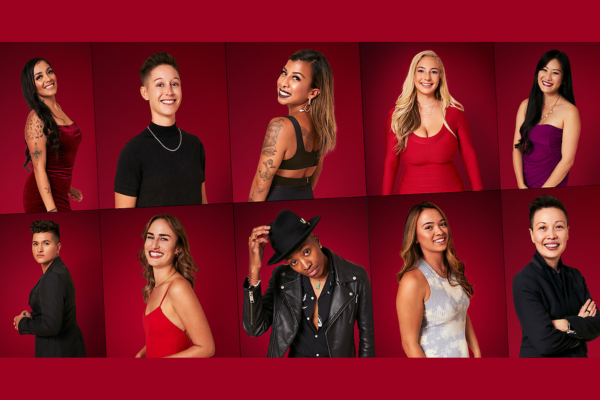When I first heard that there was going to be a sapphic season of the dating reality series The Ultimatum, I was ecstatic. Yet unfortunately, even with five queer couples, The Ultimatum: Queer Love catered too much to heterosexual, cisgender, and monogamous people.
The premise for The Ultimatum is truly bananas. The show starts with five couples, and one person in each couple has issued an ultimatum: you either marry me or we break up forever. Next, all ten contestants mingle and date each other, and after one week, they choose another person to enter into a three-week “trial marriage.” After three weeks, each person is reunited with the person they came with for another three-week “trial marriage.” At the end of the show, every couple decides whether they want to get married or move on.
In some ways, the queer season of The Ultimatum was queer as hell. We had couples like Vanessa and Xander whose previous boyfriends were best friends in high school, and contestants like Sam who loved tarot reading and Rae who called herself a “boob girl.”
The show also felt much gayer than the heterosexual season because all ten contestants were in competition with each other, including their original partners. What’s gayer than dating someone your ex is currently dating?
But that’s where the likeness with our community stopped. The show was hosted by actress JoAnna Garcia Swisher, who is not queer; this is established in the first episode when one of the contestants directly asks her. Even though Swisher’s role in the show was minimal, every time she talked to the contestants, her straightness was highlighted.
For example, in the second episode, one of the contestants asked Swisher if she knew what a “power bottom” was, and even though she said yes, the discussion still reinforced her heterosexuality. Similarly, during the finale, more than one contestant made comments about how difficult and expensive it can be for queer people to have children, as if needing to explain that to Swisher, and by proxy, the presumably straight viewer. Had there been a queer host, this could have been avoided and the show would have felt more realistic and inclusive.
Unfortunately, in many ways, the show was far from inclusive, especially regarding gender identity. In the show’s promotion, the contestants are listed with their pronouns, and a few of the contestants, including Mal and Xander, are listed as using she/they pronouns. Tiff is listed as using they/them pronouns, and Aussie is listed as using Aussie. However, at no point in the show did anyone introduce themselves with their pronouns, and their pronouns were not labeled during the episodes. It seems as though some of the contestants were also repeatedly misgendered with no corrections, which would be absolutely unacceptable.
In addition, the show never considered polyamory, open relationships, or the rejection of marriage as a concept. The premise of The Ultimatum itself is built on the idea that you leave with one person, not more than one, and when a contestant considers breaking out of that mold, they are villainized.
For example, in the early episodes, when Vanessa tells Lexi that she might not be interested in marriage, Lexi goes after her as being here for the “wrong reasons,” without considering that people have different preferences. Likewise, when another contestant says she is in love with two people at the same time, no one suggests that she could leave with both of them if all three contestants were in agreement.
While I had high hopes for The Ultimatum: Queer Love, I was disappointed in how rigid the rules were. Without a queer host, the basic recognition of people’s gender identities, and acknowledgement of the possibility of polyamory or rejecting marriage, The Ultimatum: Queer Love was only queer in name.


